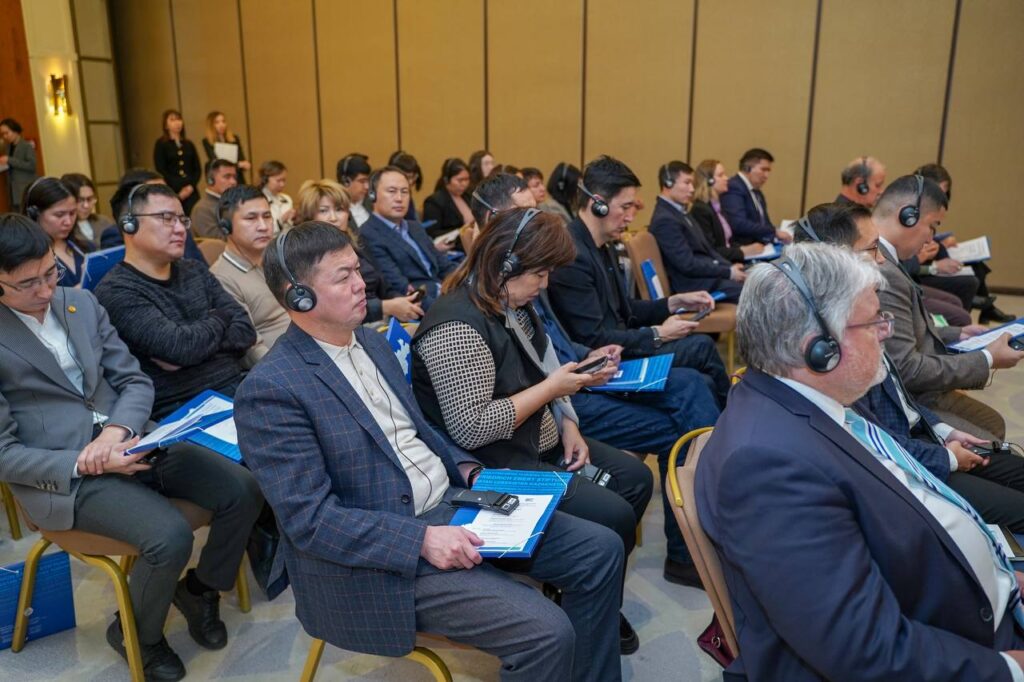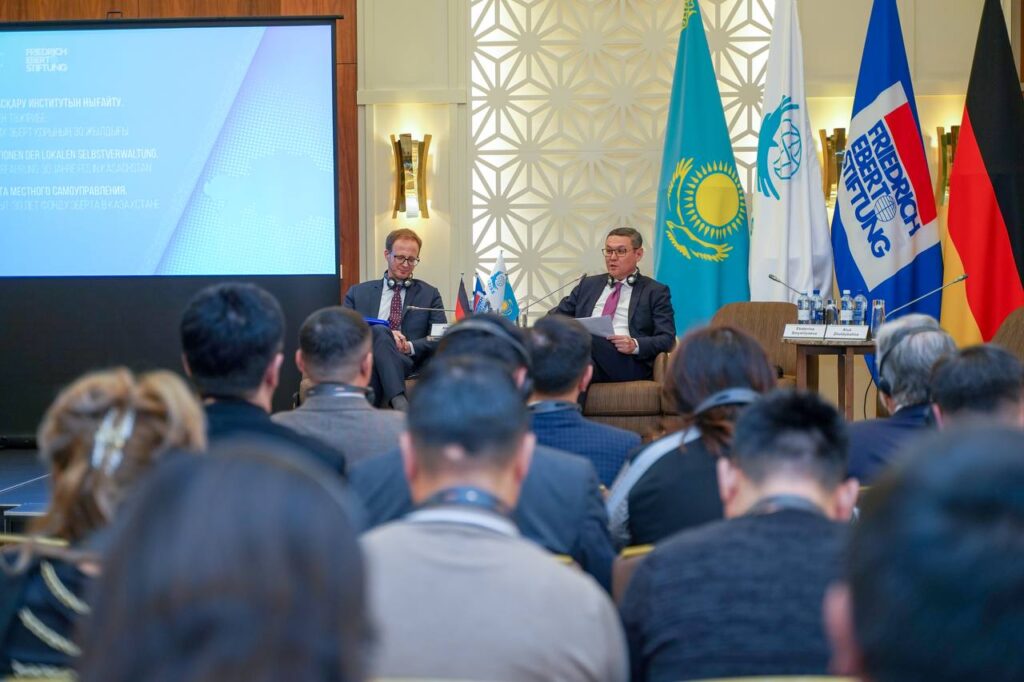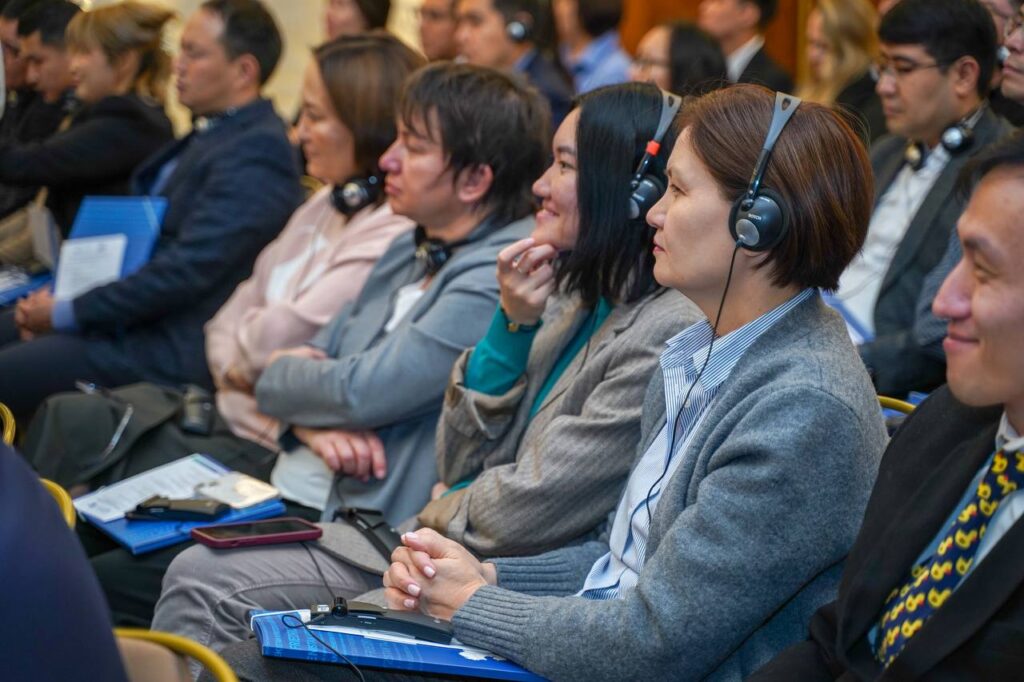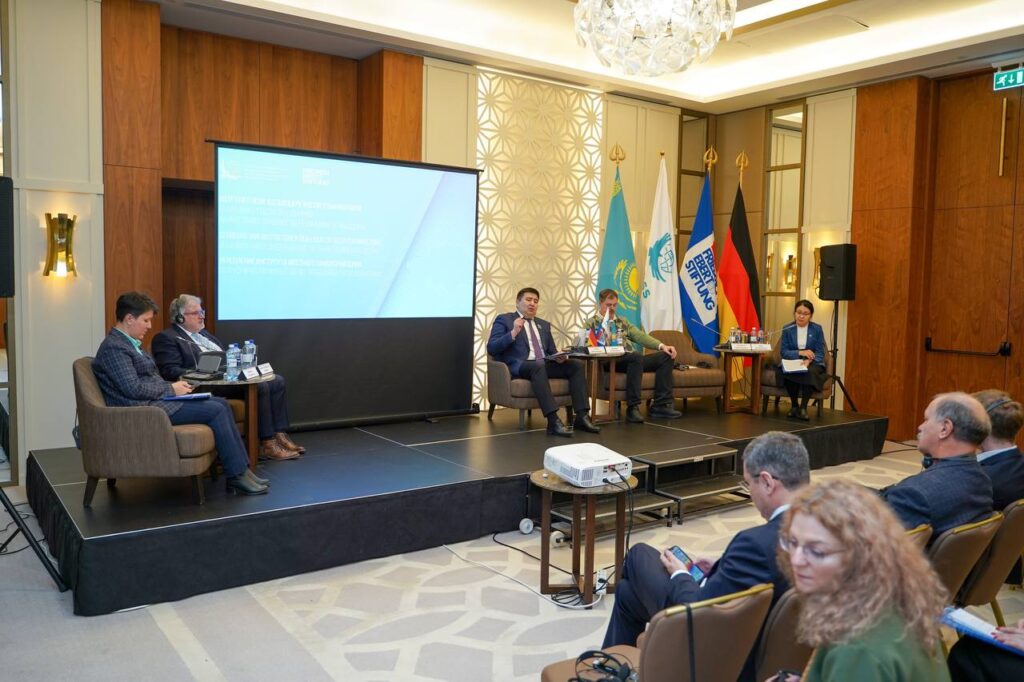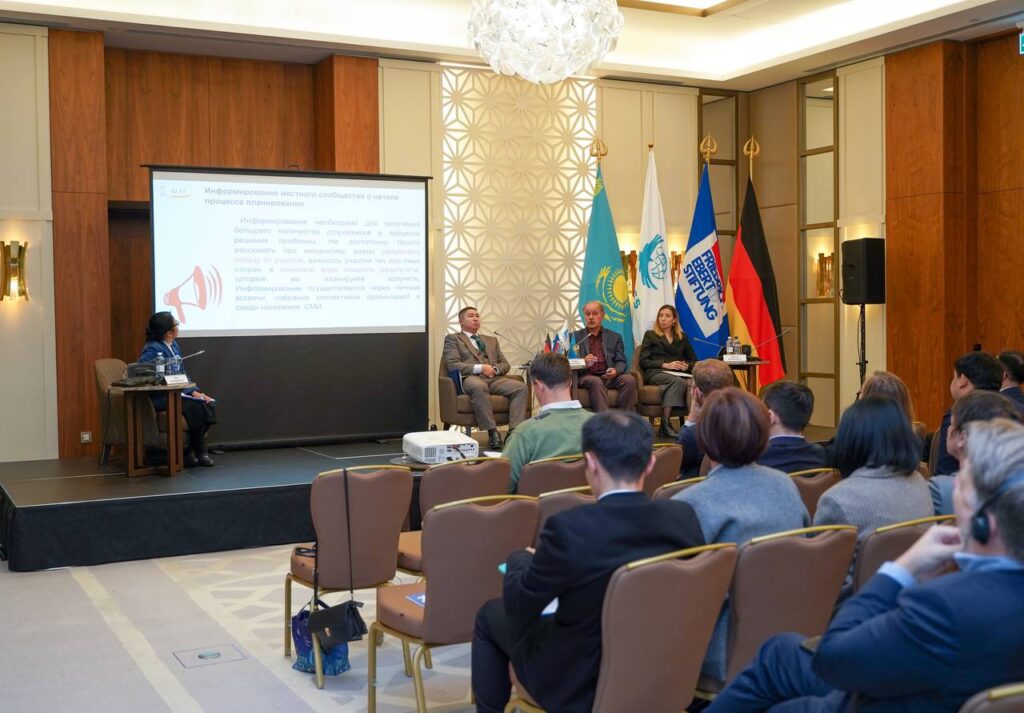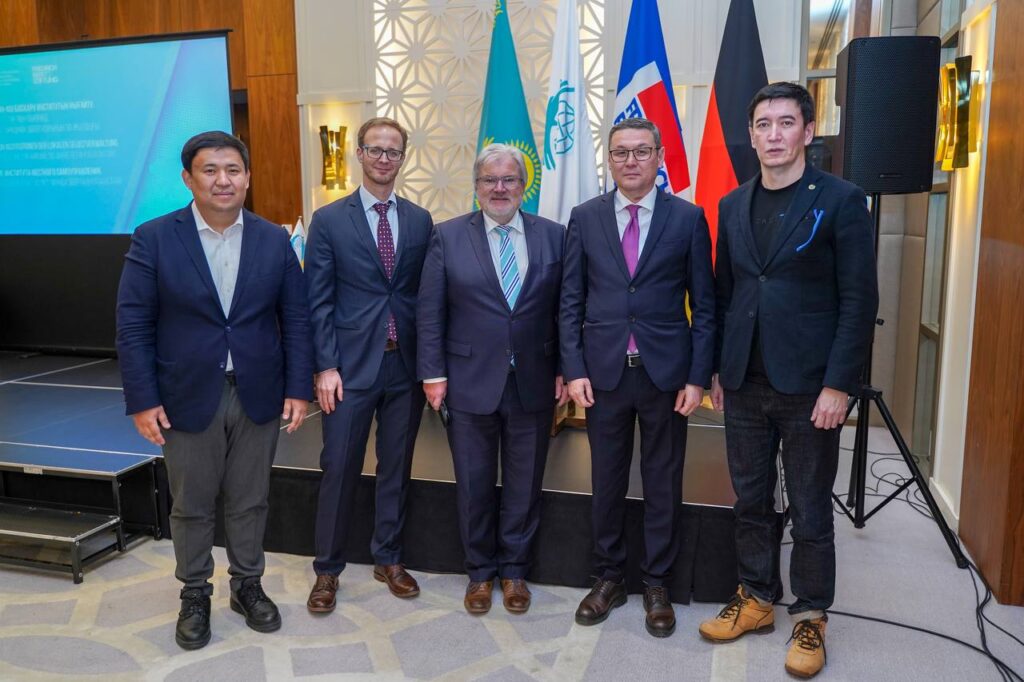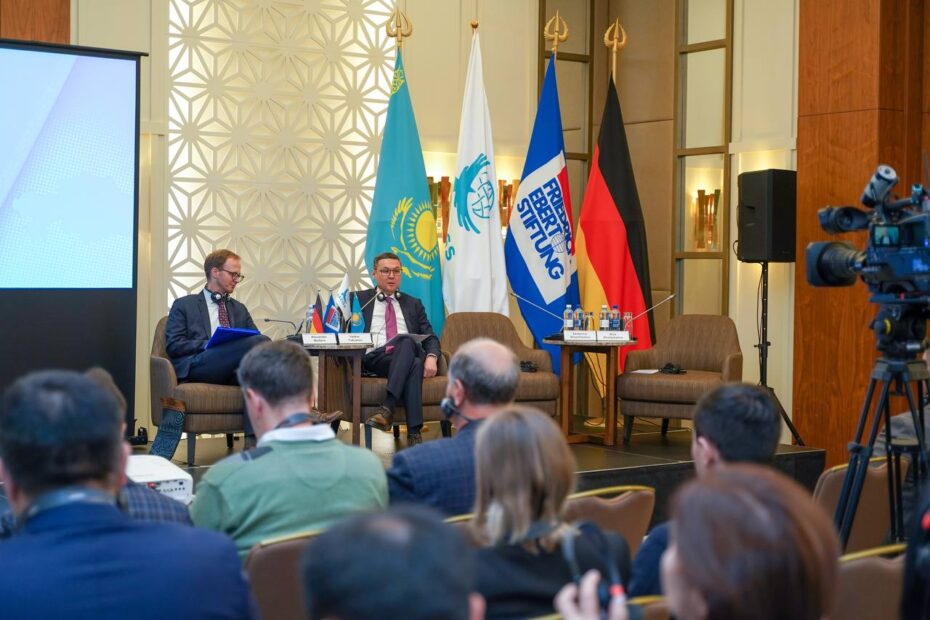On November 10, 2023, a conference titled «Strengthening the Institute of Local Self-Government. Cooperation and Experience: 30 Years of the Friedrich Ebert Foundation in Kazakhstan» took place in Astana. The event was organized by Kazakhstan Institute for Strategic Studies under the President of the Republic of Kazakhstan (KazISS) in collaboration with the Friedrich Ebert Foundation in Kazakhstan. The conference brought together leading domestic and international experts, as well as representatives from governmental bodies and the non-governmental sector. The event was dedicated to two significant anniversaries – the 30th anniversary of Kazakhstan Institute for Strategic Studies and the 30th anniversary of the Friedrich Ebert Foundation in Kazakhstan.
In his welcoming speech, Yerkin Tukumov, director of KazISS, expressed gratitude to the Friedrich Ebert Foundation for their long-term collaboration. He stated, “Thirty years of cooperation between KazISS and the Foundation is a significant achievement. The Friedrich Ebert Foundation is one of our most reliable partners. I would like to thank the Foundation for its long-term collaboration and contribution to the development of science in Kazakhstan. We hope for the continuation and expansion of cooperation in the future,” said the head of the institute.
Continuing his speech, director of KazISS emphasized that the topic of today’s event – the issue of local self-government – is crucial in the context of political and economic reforms in Kazakhstan. “The question of effective local self-government directly affects every citizen. This mechanism is important for timely resolution of emerging issues in cities, villages, and districts. It can be confidently stated that in Kazakhstan, there are already the necessary tools for the further development of local self-government,” noted Y. Tukumov.
“In Germany, local self-government is the foundation of state and democratic development. In the United States, a significant portion of elected positions falls at the state level. Almost all issues are resolved at the local level: from building schools and pipelines to organizing transportation. No one turns to Washington for solutions,” he added.
According to Yerkin Tukumov, the elections of district akims (heads), conducted on a pilot basis this month, allow akims to feel accountable to the people. “For the elected akims, it becomes important to build relationships not only with higher levels of authority but, first and foremost, with the citizens of their district or city,” noted Y. Tukumov.
“Thanks to the ongoing reforms, residents now have the opportunity to directly participate in the elections of the akims of their localities, thereby influencing socio-economic and public changes. Since 2021, 1,700 rural akims have been elected. Last week, pilot elections of akims took place in 42 districts and 3 cities of regional significance. These elections have affected the process of institutional transformation in the local governance system. It is evident that a qualitatively new environment is being formed. This has led to the renewal of the body of akims, as seen in the characteristics of the candidates, more than half of whom were self-nominated. It also indicates the activation of civil society and contributes to a broader discussion of diverse ideas and perspectives. The average age of registered candidates was 46.4 years. This suggests the influx of representatives of a relatively young generation of administrators into local authorities, which is a good support for new solutions. Candidates come from different professional groups: economists, lawyers, teachers, engineers, and specialists with agricultural education. It is worth noting that all seven registered political parties demonstrated activity,” summarized Y.Tukumov.
In turn, Country Director of the Friedrich Ebert Foundation, Alexander Wolters, emphasized that the numerous challenges facing the modern world increasingly require decisive actions at the local level. “The theme of strengthening local self-government structures and exchanging views on this matter has been highly relevant throughout our 30 years of cooperation. Institutional support for communities and citizens in overcoming numerous challenges is one of the key issues on the agenda for practitioners, project managers, experts, and administrators. Strong local institutions are one of the fundamental prerequisites for achieving a sustainable social world, solidarity, and sustainable development at the level of each community,” concluded A. Wolters.
It is worth noting that among the conference participants were Madina Nurgaliyeva, the head of the Public Policy Institute of the “Amanat” party; Friedrich Wilhelm Rebe, the former mayor of Fronenberg (Germany); Yelnur Beyssenbaev, a deputy of the Mazhilis of the Parliament of Kazakhstan; Andrey Chebotarev, the director of the Center for Current Studies “Alternative”; Yekaterina Smyshlyaeva, a deputy of the Mazhilis of the Parliament of Kazakhstan; Mirzhan Imanbayev, the deputy director of the Department of Regional Analysis and Local Self-Government Development of the Ministry of National Economy of Kazakhstan; and Sergey Khudyakov, the director of the Institute for Local Self-Government Development.
Concluding the conference, participants reached a consensus on the need to strengthen dialogue and cooperation in the field of local self-government. The discussed topics, including social democracy, citizen participation, participatory budgeting, and the organization of local elections, underscored the importance of developing strong and effective mechanisms of local governance. Participants expressed confidence that dialogue and experience exchange between countries and regions contribute to finding the best solutions and practices capable of improving citizens’ lives and ensuring sustainable development at the local level.
